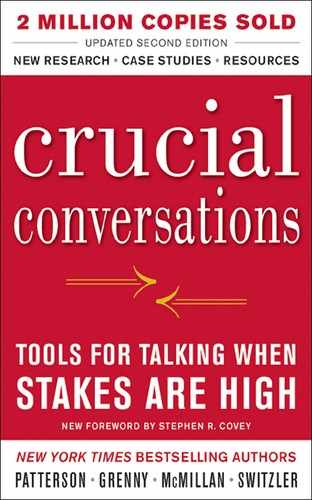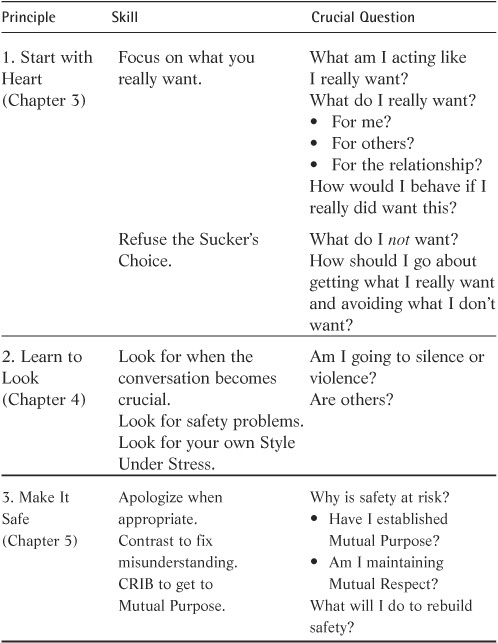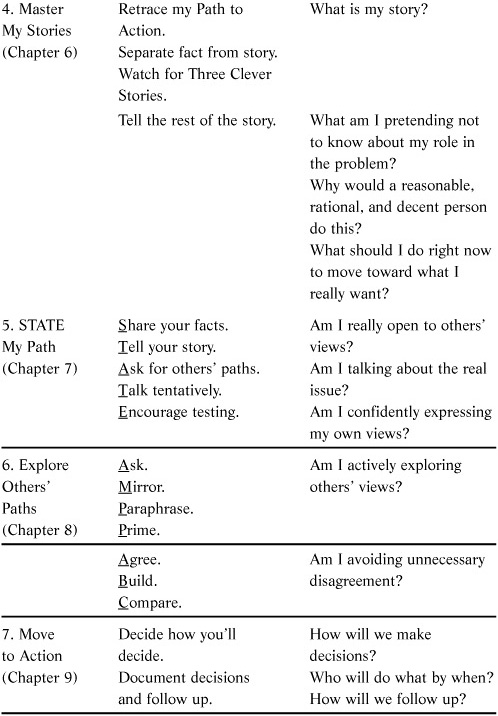HOW TO PREPARE FOR A CRUCIAL CONVERSATION
Here’s one last tool to help you turn these ideas into action. It’s a powerful way of coaching yourself—or another person—through a crucial conversation. It can literally help you identify the precise place you are getting stuck and the specific skill that can help you get unstuck.
Take a look at the following table, Coaching for Crucial Conversations. The first column in the table lists the seven dialogue principles we’ve shared. The second column summarizes the skills associated with each principle. The final column is the best place to start coaching yourself or others. This column includes a list of questions that will help you apply specific skills to your conversations.
Coaching for Crucial Conversations
Let’s See How It All Works
Finally, we’ve included an extended case here to show how these principles might look when you find yourself in the middle of a crucial conversation. It outlines a tough discussion between you and your sister about dividing your mother’s estate. The case is set up to illustrate where the principles apply and to briefly review each principle as it comes up in the conversation.
The conversation begins with you bringing up the family summerhouse. Your mother’s funeral was a month ago, and now it’s time to split up both money and keepsakes. You’re not really looking forward to it.
The issue is made touchier by the fact that you feel that since you almost single-handedly cared for your mother during the last several years, you should be compensated. You don’t think your sister will see things the same way.
Your Crucial Conversation
YOU: We have to sell the summer cottage. We never use it, and we need the cash to pay for my expenses from taking care of Mom the past four years.
SISTER: Please don’t start with the guilt. I sent you money every month to help take care of Mom. If I didn’t have to travel for my jobs, you know I would have wanted her at my house.
You notice that emotions are already getting strong. You’re getting defensive, and your sister seems to be angry. You’re in a crucial conversation, and it’s not going well.
Start with Heart
Ask yourself what you really want. You want to be compensated fairly for the extra time and money you put in that your sister didn’t. You also want to keep a good relationship with your sister. But you want to avoid making a Fool’s Choice. So you ask yourself: “How can I tell her that I want to be compensated fairly for the extra effort and expense I put in and keep a good relationship?”
Learn to Look
You recognize a lack of Mutual Purpose—you’re both trying to defend your actions rather than discuss the estate.
Make It Safe
Contrast to help your sister understand your purpose.
YOU: I don’t want to start an argument or try to make you feel guilty. But I do want to talk about being compensated for shouldering most of the responsibility over the last few years. I love Mom, but it put quite a strain on me financially and emotionally.
SISTER: What makes you think you did so much more than
I did?
Master My Stories
You’re telling yourself that you deserve more because you did more to care for your mother and covered unplanned expenses. Retrace your Path to Action to find out what facts are behind the story you’re telling that’s making you angry.
STATE My Path
You need to share your facts and conclusions with your sister in a way that will make her feel safe telling her story.
YOU: It’s just that I spent a lot of money taking care of Mom and did a lot of work caring for her instead of bringing in a nurse. I know you cared about Mom too, but I honestly feel like I did more in the day-to-day caregiving than you did, and it only seems fair to use some of what she left us to repay a part of what I spent. Do you see it differently? I’d really like to hear.
SISTER: Okay, fine. Why don’t you just send me a bill.
It sounds as though your sister isn’t really okay with this arrangement. You can tell her voice is tense and her tone is one of giving in, not of true agreement.
Explore Others’ Paths
Since part of your objective is to maintain a good relationship with your sister, it’s important that she add her meaning to the pool. Use the inquiry skills to actively explore her views.
YOU: The way you say that makes it sound like maybe that suggestion isn’t okay with you. [Mirror] Is there something I’m missing? [Ask]
SISTER: No—if you feel like you deserve more than I do, you’re probably right.
YOU: Do you think I’m being unfair? That I’m not acknowledging your contributions? [Prime]
SISTER: It’s just that I know I wasn’t around much in the last couple of years. I’ve had to travel a lot for work. But I still visited whenever I could, and I sent money every month to help contribute to Mom’s care. I offered to help pay to bring in a nurse if you thought it was necessary. I didn’t know you felt you had an unfair share of the responsibility, and it seems like your asking for more money is coming out of nowhere.
YOU: So you feel like you were doing everything you could to help out and are surprised that I feel like I should be compensated? [Paraphrase]
SISTER: Well, yes.
Explore Others’ Paths
You understand your sister’s story now and still disagree to a point. Use the ABC skills to explain how your view differs. You agree in part with how your sister sees things. Use building to emphasize what you agree with and to bring up what you differ on.
YOU: You’re right. You did a lot to help out, and I realize that it was expensive to visit as often as you did. I opted not to pay for professional home health care because Mom was more comfortable with me taking care of her, and I didn’t mind that. On top of that, there were some incidental expenses it doesn’t sound like you were aware of. The new medication she was on during the last eighteen months was twice as expensive as the old, and the insurance only covered a percentage of her hospital stays. It adds up.
SISTER: So it’s these expenses you’re worried about covering? Could we go over these expenses to decide how to cover them?
Move to Action
You want to create a definite plan for being reimbursed for these expenses, and you want it to be one you both agree on. Come to a consensus about what will happen, and document who does what by when, and settle on a way to follow up.
YOU: I’ve kept a record of all the expenses that went over the amount that both of us agreed to contribute. Can we sit down tomorrow to go over those and talk about what’s fair to reimburse me for?
SISTER: Okay. We’ll talk about the estate and write up a plan for how to divide things up.


